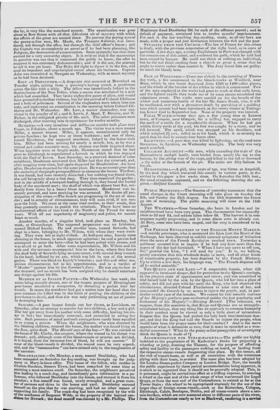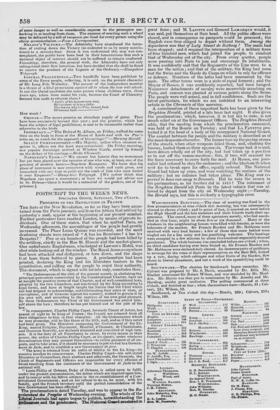Peer lc MoURuiwn.—The Gazette of yesterday announces that the usual
changes in the Court mourning will take place on Sunday the 8th, and Sunday the 29th August. On the 19th September the Court go out of mourning. The public mourning will cease on the 11th August.
THE WEATIIER.—Since Saturdays the heats in London and its neighbourhood have been very great. The thermometer has repeatedly risen to 83 and 84, and seldom fallen below 80. The harvest is in con- sequence rapidly progressing, and in some places corn is already cut. At Bury, some oats have been reaped, and the crop is considered to be good. .
TUE FRENCII REVOLUTION' IN THE ENGLISII MONEY MARKET..
—A notable personage, who is accounted the Lion (not the Bear) of the Exchange, has been observed to exhibit unusual symptoms of irritation since the news of the French Revolution reached town. Yesterday a quidnunc accosted him to inquire if he had any later news than the papers of the day had furnished. " When I have any news to tell you, Sir," growled the Lion, " I will . send for you." It is, we believe, pretty notorious that this wholesale dealer in news, and all other kinds of transferable property, has been deceived by the French Ministry. Up to within a few days, his language was, " The French disputes will all be settled amicably."
Tim QUEEN AND THE LADY—" A respectable female, whose life appeared in imminent danger, fled for protection to the Queen's carriage, in the greatest state of apprehension and terror, and was astonished to iind herself held by the arm by the Queen, who led her into a place of safety, and did not part with her until the King, who had observed the circumstance, directed Colonel Fitzclarence to take care of her, and commanded the Guards by no means to injure the people, and, in par- ticular to take care of the females. We cannot let this amiable instance of her Majesty's goodness pass unobserved amidst the just popularity and bonhommie of his Majesty."—Norning Herald. [The inference, we suppose, from this anecdote is, that Kings and Queens are so strangely- constituted beings, that any thine like an approach to common humanity in their conduct must be viewed as only a little short of miraculous. Suppose that the Queen had pushed the lady back into imminent dan- ger, and that the King had told the Guards to injure the people, what would have been the proper name for their conduct ? And is the mere opposite of what is detestable so rare, that it must be recorded as a won- derful occurrence ? What do the penny-a-line panegyrists of sovereignty think the Queen is made of?] ACCOMMODATION FOR STEAM-PACKETS.—The public are highly indebted to the proprietors of St. Katherine's Docks for projecting a wharfing or jetty, fronting the Thames, for the purpose of affording safety and facility to the passengers walking on board, or landing from the respective steam-vessels frequenting that place. By this means, all the risk of transit-boats, as well as all contention with the watermen plying with their boats, is avoided. The same plan has been adopted by the London Steam-packet Company at London Bridge. Now, the benefit the public experience by these partial accommodations being apparent, it is much to be regretted that it should not be generally adopted. This, it is presumed, might be carried into effect at a trifling expense, by erecting a wharf at the east end of the whole range of what was termed the Legal Quays, or from the east end of the Customhouse, to extend as far as the Tower Stairs : this wharf to be appropriated expressly for the use of the larger class of foreign steam-vessels—such as the Rotterdam, Cologne, Edinburgh, Calais, Boulogne, Dublin, and all steam-vessels above a cer. tain burthen, which are now scattered about in different parts of the river, from the Customhouse nearly as low as Blackwell, rendering it a service of some danger as well as - considerable eupense to the passengers evil. 'barking in ()Handing from them. The expense-of erecting such a wharf may be defrayed by a toll of twopence per head forevery person using the .cheap accommodation.—From a Correspondent. NELSON'S VICTORY.—The Admiralty have abandoned the inten- tion of cutting down the Victory (so endeared to us by many associa- tions) to a seventy-four. Since it was understood this step was con. templated, the public have been loud in their lamentations that such a national object of interest should not be suffered to remain unaltered. Consulting, therefore, the general wish, the Admiralty have not only relinquished their first intention, but have decided that she shall be fitted to receive the pendant of the Captain of the Ordinary.—Hampshire Telegraph.. LIBERAL PROCEEDINGS.—Two handbills have been published by • some of the Essex people, reflecting, it is said, on the private character of Mr. Long Pole Wellesley. The answer of the independent member is a threat of a libel prosecution against all to whom the law will attach. Is not the liberal candidate the same person whose children were, three years ago, taken from under his care, because the Court of Chancery deemed him unfit to educate them ?
"Jack's of his honour very nice, He's jealous of it to a tittle.
The reason why i—Why, honest Jack
Of honour path
-How much ?
Gaoust.—The moors promise an 'abundant supply of game. They have been extensively burned this year ; and the practice, which has been the subject of legal prohibition, is said to be favourable rather than otherwise to the birds.
IMPORTANT.—" The Duke of St. Albans, on Friday, walked for some time on the leads in front of the House of Lords and with his Peer's robes on, to watch for the approach of his carriage ?"—Morning Herald. SELECT COMPANIONSHIP.—His Majesty, unless when occasion re- quires it, affects not the least state ceremonial. On Friday morning, our popular Sovereign arrived at Windsor Castle, sealed by himself on the dickey of his. carriage.—Berks Chronicle. NAPOLEON'S TOMB.—" We cannot but lament that no monument 1 has yet been placed over the remains of one Who was, at least, one of the I greatest of modern heroes—Napoleon Bonaparte. We learn that his place of interment is now overgrOwn with weeds and rank grass, and unmarked with any type to point out the tomb of him who once lorded it over Emperors."—HampAhire Telegraph. [We rather think that -Napoleon can spare a monument; at least we would not advise one ; in St. Helena—there it would be a memorial of the gaolers, not of the 'prisoner.]



























 Previous page
Previous page